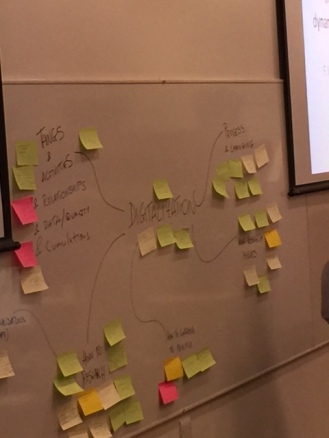Last Sunday marked the 9th anniversary of this blog. I know that blogs are a bit old-fashioned, but I still enjoy blogging, and, overall, I have gained much from doing it. Hence, as a sort of celebration, I thought that I would share with you some of reasons why you might consider blogging, if (or, even, because) you are an academic researcher.
Before starting, though, please remember that what I am suggesting, here, reflects my personal experience and circumstances. That is, I am an academic researcher, who works for a UK university, and who writes on a personal capacity. Others, in different circumstances, may have very different experiences.
Reasons to blog #1: Develop your work
Many people see blogging as a distraction from work, or a source of procrastination. My husband for instance! And, let’s face it, if you are not careful, it can take up a lot of your time. However, the main benefit that I, personally, derive from blogging is that it helps me to develop my own work. It is part of my research pipeline. My blog posts often focus on something interesting that I have come across and which is relevant for my work. For instance, a journal article, a book, a podcast episode, a news article, a YouTube video, a promotional leaflet, etc. Effectively, most of my posts are what Daniels and Feagin call ‘public note-taking’. This public note-taking works for me on many dimensions. First, it enables me to capture, in writing, my thoughts before I forget them. Second, it keeps my notes and source materials in one easily searchable place, which saves me a lot of time when writing up something, and when searching for a reference for my papers or an example for my talks and my teaching. Third, having to come up with new content for the blog forces me to process those many items on my ‘to read / watch / listen’ list sooner than I would otherwise do. Fourth, as others learn what sort of topics you are interested in, they bring other interesting examples to your attention.

One example of this type of blogging is Patter, by Pat Thomson. Thompson mostly blogs about scholarship, the research process, and academic writing. She also publishes books and articles about these topics, and she does talks and workshops on related to these.
Make sure that you acknowledge the source of your material. I would also add a link to the original material, ideally an open access version. One note of caution: websites go down, material gets removed and links change. So, if you can, download the image / video / sound file that you are referring to for ease of access and future reference.
Reasons to blog #2: Promote your work
Writing a short blog post about your work can also be a very effective way of bringing it to the attention of potential readers. It works because you are cutting through the noise of all the tables of contents and keyword alerts vying for your colleagues’ attention, and giving them a quick overview of what your paper is about and why it might be relevant for them. In fact, due to budget cuts and access embargoes (which, in some cases, are longer than one year!), even researchers that were aware of your new article and motivated to read it, may not be able to do so – so, this may be the only way they get to see your latest work. Also, let’s not forget that a significant proportion of your potential audience simply do not have access to academic journals – politicians, journalists, managers, and so on. The general public would have to pay to access individual papers, meaning that the likelihood of them reading your paper because the title and abstract looked very interesting (and, often, they don’t) is, indeed, very low.

You don’t have to believe me – check Melissa Terras’s analysis of how blogging (and tweeting) about her research has impacted on paper downloads.
Having said that, I do NOT recommend sharing the findings from your research before they have been accepted for publication. This is not so much a matter of plagiarism (on the contrary, it might help you in a dispute), but rather a matter of originality of your research (which is a key criterion of acceptance by top journals). And I would I recommend checking Patrick Dunleavy’s very helpful blog post about how to write a blogpost from your journal article.
Reasons to blog #3: Engage with your work’s audience
Academics (in the UK, at least) are increasingly encouraged to focus on research that has societal impact, and this often requires engaging directly with the beneficiaries of their research. This goes beyond making your results available (for that, see reasons to blog #2). Rather, this is about capturing the beneficiaries’ voices and perspectives throughout the whole research process – from agreeing research questions, to designing data collection and making sense of the findings. Blogs can be very helpful for this end, because they can offer a central point to aggregate all materials relating to the project, allows for different formats of material (e.g., notes, polls, images, recordings, ….) to be stored or shared, enable remote access and participation (e.g., completion of surveys), and access to some or all content can be restricted. It also offers more flexibility than an institutional website, and may be particularly relevant for multi-institutional research.

One example of this type of blog is the Nappy Science Gang project, which looked at issues around the cleaning and maintenance of cloth nappies.
You do need to look after the privacy of those involved and secure the project’s data. So, you should definitely spend some time and money designing and putting in place the appropriate data protection mechanisms. Something else to keep in mind is that, if you host your blog on a free platform like WordPress or Weebly, visitors to your website will see adverts, which may go against your funders’ conditions, and/or may cause embarrassment.
Reasons to blog #4: Community support and community building
Blogging can also be an effective way of sharing advice with others starting out, or answering those commonly asked questions about life in academia, or doing a PhD, or an aspect of the research process, to name a few. Next time, you get yet another e-mail asking you, for instance, how to decide whether to do a PhD, instead of copying and pasting your stock answer, you can direct them to your blog post answering that question. Or, instead of sending them a number of links to articles or webpages that they may find useful you can just direct them to a section of your blog that address that topic.

One example of this is Raul Pacheco-Vega’s blog which includes a ‘resources page’, with content on topics that he is frequently asked about, from his note-taking techniques to how to conduct a literature review.
The main risk here is investing too much time in creating something really complete or that looks really nice, but… which has limited value to you or, even, others. If you are doing this kind of blogging, you need to stay focused, remind yourself of your priorities and set strict time limits. Do not confuse being an academic who blogs, with being an ‘academic blogger’.
Reasons to blog #5: Creativity and experimentation
While academics write a lot, it can feel very formulaic and, at times, stifling. In contrast, blogging can offer you an opportunity to experiment with different forms of communication – not just writing, but also drawing, photography, short videos and so on. Even if you stick to writing, blogging offer you an opportunity to experiment with different lengths, and styles and voices. Blog post tend to use a more conversational tone than a typical academic article or even an institutional website. It also offers you the opportunity to tweak and update your posts as often as you wish. You can always revisit something that you posted before, and change something, add to it, or try a different way of presenting the same idea.

I couldn’t actually find an example of a blog, by an academic, which focused on creativity and experimentation. I could only find occasional examples of experimentation here and there, for instance on Mark Carrigan’s blog. The closest one I can think of is Austin Kleon’s blog, which you can find here. Kleon is not an academic, but he is an author, and I enjoy his posts immensely.
The one thing I would warn you about, if you are focusing on this type of blogging, is to not confuse ‘busyness’ with progress. Editing and beautifying is great… but you need to get that manuscript out!
Reasons to blog #6: Journaling and accountability
Blogs actually started as online records of activities or ideas’ developments. The name blog comes from ‘weblog’, referring to a log kept on the web. And many bloggers still find them most useful as a way of keeping a record of what they do, or what they have read or listened to, and so on. Along these lines, knowing that you will have to write, say, a weekly progress report can be a powerful motivator to make progress on your work. For instance, finishing that book so that you can write about it (see reasons to blog #1), count how many hours you have written, or track progress on a long-term goal.

One example of this type of blogging is Bex Lewis, who blogs almost daily about her professional activities, as well as her life as a cancer patient. Pat Thomson also has occasional research diaries, over on Patter, such as this entry relating to one of her summer schools.
Be mindful that, even though you are writing on a personal capacity, your students, employers or project partners may be reading your blog posts, and they may take offence with something that you write. So, I would stay away from confessional writing. Mark Carrigan, in his book Social Media for Academics, tells the case of a researcher who was prevented from entering the US because, many years earlier, he had written about experiment with LSD. Also, as per reasons to blog #2, be careful not to share findings before they are published.
There you go, six reasons why you might want to give this blogging thing a go. What are other benefits from blogging? And what is your advice for academics who blog?


Great 9th Anniversary blog Ana! I am continually surprised just how few academics engage with social media, whether through a blog or Twitter etc. I find social media the single most valuable source of information for my specialist area (retail).
LikeLike
Thank you, Nelson. Great minds think alike 😉 PS – are you following @oxondon on Twitter?
LikeLike
Yes I am Ana, and have read Jonathans’s excellent book about Navigating the New Retail Landscape published a couple of years ago.
LikeLike
Happy ‘Blogday’ – I am not a researcher and barely academic these days but I still follow and enjoy your blog – frequently inspired, debbie x
LikeLike
Ah! I like that word. I very much enjoy your posts, too – don’t stop blogging.
LikeLike
This was so timely for me! Thank you for all the tips and links you provided.
Blogging has helped me not lose my passion for research and writing after I left the academic world after graduating. Still, sometimes I struggle with making sure my writing is professional while at the same time wanting to be authentic and have my voice heard. Sometimes, it feels too… academic, and I lose interest. I need to remind myself that I don’t always need to have a link for every single sentence I write, or a peer-reviewed reference. It’s my blog, after all.
LikeLike
Thank you, Mehret. I am so glad it was helpful. Though, I have to say that the writing in your blog is beautiful, and clean, and warm. PS: did you really quite social media? I am in awe…
LikeLike
I really appreciate your kind words! It made my day!
And, I really did lol. I only had a Twitter account by 2013, and quit that in 2017, then LinkedIn a few months back. Freedom!!! You can give it a try by deactivating accounts for a period of time and see how you feel. 🙂
LikeLike
Congratulations Ana! 9 years is great feat. Technically I started mine almost 11 years ago, but I have had several long absences – your stamina is better than mine. I agree with your reasons – self-discovery and learning coexist with community-building and group support.
I look forward to your 20-year celebration!
LikeLike
Well, thank you. That is very kind. I find that the longer you leave between blog posts the harder it is to come back, because you feel you need to come up with something special to make up for the silence. Do you feel that, too?
LikeLike
Fighting that right now!
LikeLike